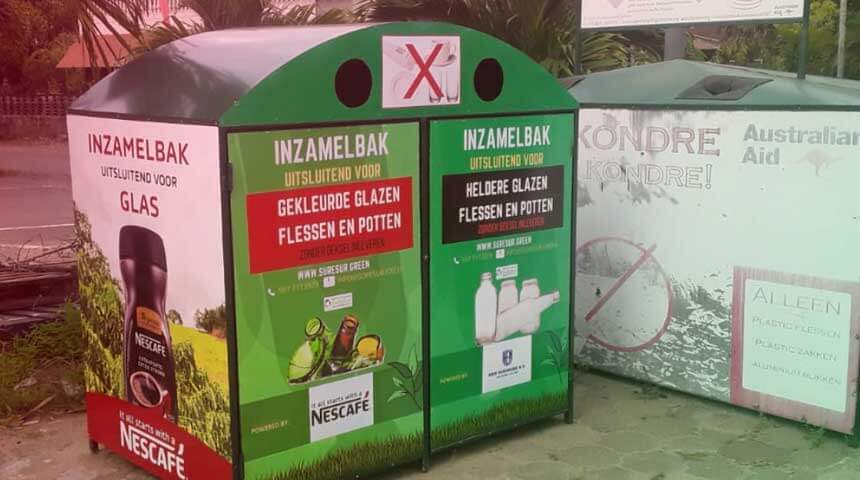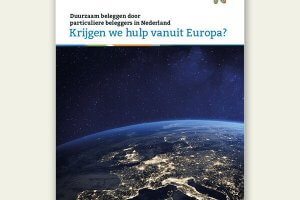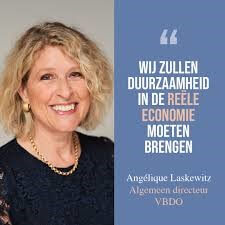Plastics and recycling in Suriname

Task for Companies, Schools and of course the Government
eyesonsuriname
Amsterdam, 5 may 2023 — 185 investors with total assets under management worldwide in excess of $10 trillion have signed a statement. In the statement, they demand that companies take a more radical approach to reducing their reliance on plastics.
They call on intensive users of plastic packaging – such as FMCGs and supermarkets – to act faster to combat the plastic crisis.

Companies should significantly reduce their consumption of single-use plastic packaging, implement packaging reuse systems, phase out hazardous chemicals in plastics, and advocate – not against – policies to support these actions.
185 Investors with a combined capital of US$ 10 trillion, coordinated by the Association of Investors for Sustainable Development (VBDO), are joining forces and calling for more action to combat the plastic crisis.

In a joint statement, they warn that the entire life cycle of plastic poses a serious and growing threat to the environment, climate, biodiversity, human rights and public health.
The estimated cost to society of plastic pollution – including cleanup, ecosystem degradation, shortened life expectancy and medical treatment – is more than $100 billion a year.
The signatories argue that failure to address these impacts exposes companies to financial risks that threaten value creation and investment returns, given the wave of legislation tightening measures around the world, the growing number of lawsuits against companies and a potential threat to their reputation and brand value.
AXA IM: “With increasing concerns and awareness of biodiversity loss and environmental degradation, the food industry needs to move towards more sustainable production and consumption. An important part of this transition is reducing the industry’s dependence on plastics. As heavy users of plastic packaging, food and consumer goods companies have a key role to play in driving a scalable change. They can and should increase the financial resilience of their business models by tackling the plastic crisis.”
Investors are asking companies to significantly step up their efforts to cope with the plastic crisis. According to the Ellen MacArthur Foundation — an organization that brings major plastic producers and users together around common goals — companies will “almost certainly” miss existing goals by increasing — rather than decreasing — their use of single-use plastic packaging overall. – and undemonstrable credible and ambitious plans for reuse.

Angélique Laskewitz
Angélique Laskewitz, director of the VBDO: “It is worrying to see that most companies in the FMCG and food retail sector are taking limited measures to mitigate the financial risks of plastics.
Today, investors are sending a clear signal to these companies that they will come under increasing pressure if they do not take swift action to substantially reduce their plastic footprint.”
There are between 75 and 199 million tons of plastic in the ocean, but the problem goes far beyond the impact on the marine environment.
Cradle to grave greenhouse gas emissions from single-use plastics in 2021 equaled the United Kingdom’s total annual emissions.
The life cycle of plastics is also inseparable from the growing concern about exposure to toxic chemicals. More than 3,000 potentially harmful chemicals have been identified in food packaging.
The signatories call on companies to take a more radical approach. To cope with the magnitude of the plastic crisis, they want companies to significantly reduce material consumption, eliminate single-use packaging and scale up reusable packaging systems. Companies must show an action plan with clearly defined timelines and make progress reporting dependent on external verification.
In addition, they are calling on companies to publicly support – rather than lobby against – ambitious plastic reduction policies, including the Global Plastics Treaty and the EU Packaging and Packaging Waste Regulation (PPWR), which is currently under review.
A recent analysis showed that lobbying efforts by trade associations on the PPWR were already successful in significantly weakening some measures.
Arthur van Mansvelt, Senior Engagement Specialist at Achmea Investment Management: “Most companies are not acting fast enough in the face of the unfolding puddle of the plastic crisis. The Global Plastics Treaty offers a unique and historic opportunity to tackle the problem at source – we need companies to support its prevention and reuse ambition, not lobby against it. It is their chance to be part of the solution.”
In Suriname too, there is a clear chance to start giving a regional example of how it could be done. It is a question of attitude for Government, companies and the educational systems.
Finally, investors expect companies to commit to identifying and eliminating hazardous substances in plastics, given the significant risks they pose to human health and associated risks to financial value.
eyesonsuriname










 AXA IM: “With increasing concerns and awareness of biodiversity loss and environmental degradation, the food industry needs to move towards more sustainable production and consumption. An important part of this transition is reducing the industry’s dependence on plastics. As heavy users of plastic packaging, food and consumer goods companies have a key role to play in driving a scalable change. They can and should increase the financial resilience of their business models by tackling the plastic crisis.”
AXA IM: “With increasing concerns and awareness of biodiversity loss and environmental degradation, the food industry needs to move towards more sustainable production and consumption. An important part of this transition is reducing the industry’s dependence on plastics. As heavy users of plastic packaging, food and consumer goods companies have a key role to play in driving a scalable change. They can and should increase the financial resilience of their business models by tackling the plastic crisis.”